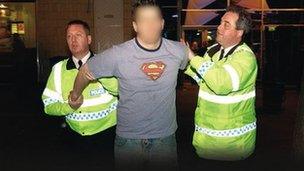'Sobriety Orders' to be piloted by government
- Published

Offenders will be made to wear ankle tags that monitor alcohol levels
Offenders who commit alcohol-fuelled crimes are to be monitored with ankle tags and breath-tested to ensure they stop drinking, under government plans.
Police will have powers to impose "sobriety orders" on drinkers cautioned for minor offences, such as criminal damage or public disorder.
There will be regular breath tests, with known weekend bingers tested then, and ankle tags to monitor movements.
The orders will be piloted in England and Wales from next month.
They are based on a scheme which has been tried out in the US.
Prime Minister David Cameron said he wanted to ensure that non-custodial sentences were no longer viewed as a soft option.
"This government wants to change this and make them a proper and robust punishment," he said.
"Criminals given a community punishment shouldn't just be able to enjoy life as it was before during their sentence."
Alcohol levels
For serious and violent criminals with drink problems, ministers want to introduce new laws enabling the courts to impose sobriety orders as part of a suspended or community sentence.
Offenders would have to wear ankle tags that continuously monitored alcohol levels, for up to four months.
The orders would allow alcohol levels to be monitored either by these tags, which test sobriety every half hour, or by requiring offenders to attend a police station daily - or at other regular intervals - to be breathalysed.
Another type of tag, which has been tried out in England, uses a GPS system which would alert the authorities when people visited certain proscribed areas - such as pubs.
Any such orders imposed as part of a conditional caution would not require new legislation.
But orders imposed as part of a suspended sentence or community penalty would require legislation. The government has tabled an amendment to the Legal Aid, Sentencing and Punishment of Offenders Bill.
Justice Minister Nick Herbert said: "Alcohol-fuelled violence and criminality causes mayhem in our towns and city centres.
"These new Sobriety Orders will allow us to tackle this problem more effectively and demand that binge drinkers who commit crime sober up."
Current policies
Shadow justice secretary Sadiq Khan said: "Increased use of community sentences, tagging, monitoring and initiatives to support those with drug and alcohol dependencies will require more resources.
"The government need to answer important questions about how they propose to fund increased use of community sentences given the Ministry of Justice budget faces cuts of a quarter.
"False targets for reducing prison numbers, over-stretched probation services and budget cuts... are a potent cocktail risking a gamble with public safety."
The Prison Reform Trust said the government seemed to be resorting to "populist gimmicks" when current policies were actually working and had public support.
"It's strange that in their race to find more punitive measures the prime minister and cabinet colleagues are ignoring the considerable success they have on their hands," said Trust director Juliet Lyon.
"Community sentences consistently outperform short jail terms and intensive supervision by police, probation and voluntary mentors are cutting crime.
"With public backing for community payback, why go for populist gimmicks?"
- Published8 March 2012
- Published15 February 2012
- Published16 July 2011